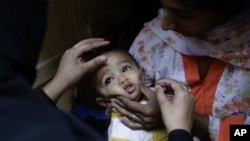ISLAMABAD —
World Health Organization officials say Pakistan has made “remarkable” progress in reducing the number of polio cases this year, and believe the country is in the “final stages” of eradicating the disease. But the national anti-polio campaign has suffered setbacks in recent months that experts say threaten recent gains.
Pakistan registered 198 confirmed victims in 2011, the largest number anywhere in the world. But so far this year health officials have reported fewer than 50 new cases nationwide.
At the end of this week’s three-day national immunization campaign, however, local and international health officials reported “disturbing” developments: Of 32 million children targeted for immunizations during the just-concluded drive, nearly one million were left unvaccinated.
“There are two types of missed children: one of them is if the vaccinators do not go to their home, and the other is when the parents refuse," said Dr. Elias Durry, the WHO's senior coordinator for polio vaccination in Pakistan, who confirmed the official figures. "Most of the numbers that you see here are when vaccinators either did not find the child or they themselves did not go and look for the child.”
Dr. Durry describes the number of un-vaccinated children as a “matter of grave concern," adding that health workers plan to look for the missed children because they are the ones that could sustain the transmission of the polio virus in Pakistan.
Waziristan vaccination ban
Officials also say more than 200,000 children in parts of insurgency-hit Federally Administered Tribal Area (FATA) have not received vaccinations for three consecutive months because Taliban militants have banned the immunization drive. The affected tribal districts, South and North Waziristan agencies that border Afghanistan, are known as hubs of al-Qaida and Taliban insurgents.
According to Dr. Aftab Akbar Durrani, head of the social sector for the FATA region, intensive efforts are underway to convince insurgents to lift the ban.
“Our political administration, our civil society, through media, through our law enforcement agencies, we are working on these militants," he said. "We are in close contact with them [and] negotiations are on, and we are hopeful the ban will be lifted.”
Taliban fighters have condemned the polio campaign as a cover for espionage ever since a Pakistani doctor was jailed for helping the American CIA run a fake vaccination program aimed at locating fugitive al-Qaida chief Osama bin Laden.
Insurgent leaders have alleged that information gathered during vaccination campaign is continuing to help the CIA direct drone strikes on their hideouts, and have promised to lift the immunization ban only after missile attacks are halted.
Volunteers, vaccinators attacked
Meanwhile, health officials affiliated with the polio vaccinations have been attacked, worrying the more than 250,000 volunteers working in the field. Unknown gunmen shot and killed a polio vaccinator during the immunization campaign on Tuesday near Quetta, the capital city of southwestern violence-hit Baluchistan province.
In July, armed men killed a Pakistani doctor working for the WHO while an international staff and his local driver were wounded. Both the attacks took place in Karachi during a national immunization campaign.
Senior WHO Coordinator Dr. Durry says he does not see any major impact on the anti-polio campaign because of these incidents.
“No doubt that these kind of things may hamper a bit, but I think, as you well know, despite all of these things, volunteers and health officials are still going out and trying to do what they have to do and they truly need to be commended for that and appreciated for that," he said. "They are the unsung heroes.”
Polio, a highly infectious disease that primarily affects children under five, can cause paralysis within hours and in some cases can be fatal. Polio remains endemic in only Pakistan, Afghanistan and Nigeria.
World Polio Day is October 24.
World Polio Day is October 24.








